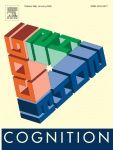
A new paper by shirilevari.bsky.social shows that sound symbolism highlights the properties that distinguish referents from their competitors: www.sciencedirect.com/science/arti...
A🧵

A new paper by shirilevari.bsky.social shows that sound symbolism highlights the properties that distinguish referents from their competitors: www.sciencedirect.com/science/arti...
A🧵
Just out in @cognitionjournal.bsky.social, led by Ryan Barker with the inimitable @drjenryan.bsky.social.
www.sciencedirect.com/science/arti...

Just out in @cognitionjournal.bsky.social, led by Ryan Barker with the inimitable @drjenryan.bsky.social.
www.sciencedirect.com/science/arti...
Our new study in Cognition examines how perceptual speed, working memory, and cognitive control mediate the link between statistical learning and language abilities.
Our new study in Cognition examines how perceptual speed, working memory, and cognitive control mediate the link between statistical learning and language abilities.

www.sciencedirect.com/science/arti...

www.sciencedirect.com/science/arti...
In @cognitionjournal.bsky.social w/ @simonkirby.bsky.social & Jenny Culbertson.
www.sciencedirect.com/science/arti...

In @cognitionjournal.bsky.social w/ @simonkirby.bsky.social & Jenny Culbertson.
www.sciencedirect.com/science/arti...

www.sciencedirect.com/science/arti...

www.sciencedirect.com/science/arti...
www.sciencedirect.com/science/arti...

www.sciencedirect.com/science/arti...




Paper: desenderlab.com/wp-content/u... Thread ↓↓↓
#AcademicSky #PsychSciSky #Neuroscience #Neuroskyence
Paper: desenderlab.com/wp-content/u... Thread ↓↓↓
#AcademicSky #PsychSciSky #Neuroscience #Neuroskyence
📢New paper from: @vladchituc.bsky.social, @mjcrockett.bsky.social, & Brian Scholl
www.sciencedirect.com/science/arti...
@cognitionjournal.bsky.social.
Moral psychologists almost always use self-report scales to study moral judgment. But there's a problem: the meaning of these scales is inherently relative.
A 2 min demo (and a short thread):
1/7
📢New paper from: @vladchituc.bsky.social, @mjcrockett.bsky.social, & Brian Scholl
www.sciencedirect.com/science/arti...
(1/7)

(1/7)


